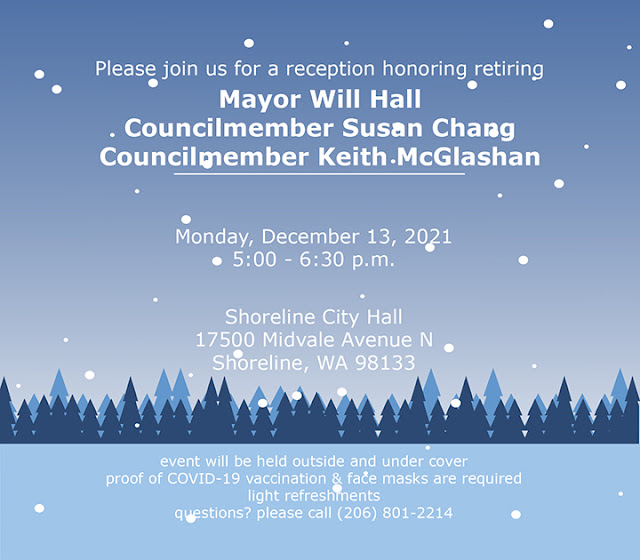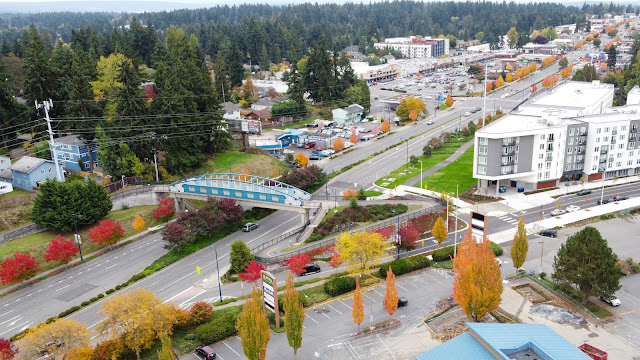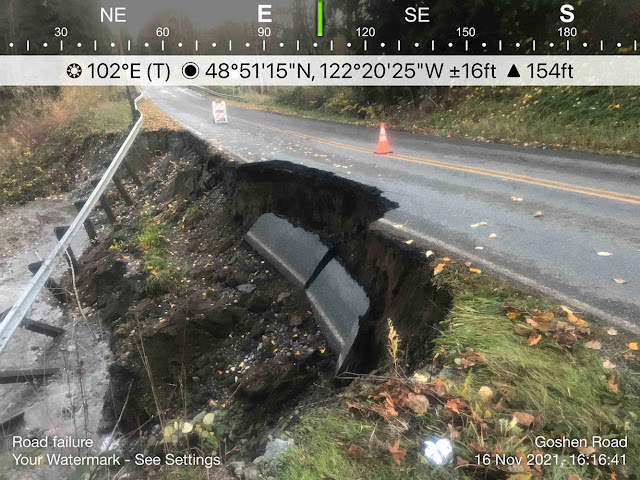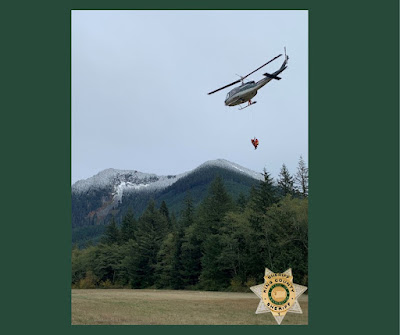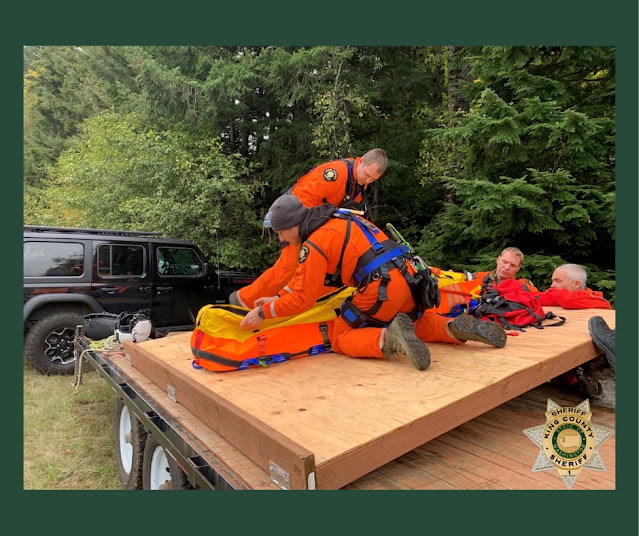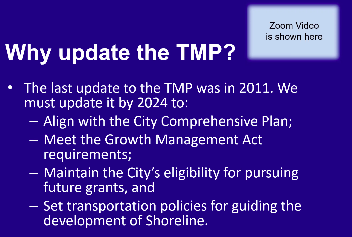 |
| Pam Cross, reporter |
Shoreline City Council MeetingNotes by Pam Cross
Deputy Mayor Scully called the remote meeting to order at 7:00pm.
Mayor Hall was excused for personal reasons. All other Councilmembers were present.
Approval of the AgendaAgenda approved by unanimous consent.
Report of the City Manager Debbie TarryCOVID-19 UPDATE
Case rates continue to slowly decline statewide and in King County we are at a level of substantial (down from high) transmission of COVID-19 infections. Unfortunately new cases are increasing in Shoreline.
Wear a mask, even if you are fully vaccinated. We encourage everyone to get vaccinated and, if eligible, get a booster shot. Masks are mandated for everyone in indoor public settings and outdoor crowded settings. To find available vaccines and for additional information, visit
doh.wa.govIn accordance with the Public Health Order effective 10/25/21 in all of King County, proof of vaccination or proof of a negative COVID-19 test taken in the last 72 hours will be required for: indoor dining, bars, and recreational activities of any size including theaters, gyms, and performances as well as outdoor events with 500 or more people. More information:
kingcounty.gov/covidVaccine Clinic for adults and children through December 17.

HOLIDAY EVENTS
The Holiday Crafts Market last Saturday had over 3,000 shoppers making it a great success.
Registration is open for the Winter Porch Light Parade.

Council Reports
CM Chang attended possibly the last meeting of the Regional Transit Committee on Service Guidelines, the Strategic Plan and the Long-Term Plan for KingCo Metro. We did the best we could for Shoreline. There was already some restructuring with the Northgate station opening and there will be more when our stations open. The amendments that passed basically allow for our buses to be moved out of our area to other areas in the County with greater needs, so there’s no guarantee we’re going to keep the bus service that we have. The most important part is that there is a provision that KingCo has to engage with the affected areas and develop a set of goals for the restructuring. There is a section in there where there is a goal of serving light rail but that the area can’t be left with worse service than they currently have. It is really unclear what that means in Shoreline because we don’t really have any routes that go east-west right now. We couldn’t get any new routes or new service which requires large concentrations of priority populations and we don’t have that. We need to make sure the City of Shoreline residents stay involved to protect our interests.
CM McConnell offered congratulations to CM Roberts for his election to the National League of Cities (NLC) Board of Directors. He was elected to a 2-year term and will provide strategic direction and guidance for NLC’s federal advocacy, governance and membership activities. NLC is the largest and most representative organization for cities, their elected leaders and municipal staff, and advocates for city priorities in Washington by building strong federal-local partnerships. The conference was remote and very busy. CM McConnell will be reapplying for the Transportation Committee.
CM Roberts thanked CM McConnell for her support for him and others. CM Roberts stated five Washingtonians were elected to the NLC board. The membership elected Tacoma Mayor Victoria Woodards as First Vice President, and Seattle Councilmember Teresa Mosqueda, Bellevue Councilmember Janice Zahn, and Vancouver Councilmember Ty Stober to two-year terms on the board. This is good representation from the Northwest for a national board of about 55.
DM Scully went to the Brotherton Cadillac groundbreaking for their new Shoreline facility and did the ribbon cutting at Grounded, a non-profit located behind Black Coffee NW.
Pro Committee Applicants
- Brian Branagan
- Katie Schielke
- Mary Ellen Stone
Con Committee Applicant
For the primary and general election, King County publishes a voters’ pamphlet. The City Council is responsible for appointing committees to prepare statements in favor of and in opposition to a ballot measure. These statements will be published in the voters’ pamphlet. Committees must submit their statements to King County Elections by December 14 and their rebuttals by December 16. The City must also provide an explanatory statement of the ballot title for the voters’ pamphlet.
DISCUSSION
Motion and second to appoint the volunteers (shown above) for the Pro and Con Committees.
DISCUSSION
Council stated appreciation for the volunteers who applied for the committees.
No additional comments.
VOTE
Passes unanimously 6-0.
Action item 8(b) Adopting the 2022 State Legislative PrioritiesJohn Norris, Assistant City Manager, made the presentation
At its November 8 meeting, the City Council reviewed and discussed the proposed 2022 State Legislative Priorities. For 2022, staff proposes the continuation of efforts to secure funding and/or other legislative support for: a bike/pedestrian bridge at N 148th Street; planning support, in collaboration with partner cities, for a regional crisis triage center; and increased investment in behavioral health and misdemeanor court diversion.
Additional issues raised on November 8 included changing the residential energy code, potentially adding a priority to seek local authority to make changes to the State’s residential Energy Code. Council also discussed whether ongoing efforts by the State to develop the Fircrest Campus ought to be included as part of the Legislative Priorities.
Staff does not recommend adding Fircrest but did prepare a potential motion regarding the residential energy code.
DISCUSSION
Motion and second to adopt 2022 State Legislative Priorities
Motion and second to amend the main motion to read:
Last week we discussed the energy code around multi-family buildings. We want to allow the City to look at the residential codes as well as the multi-family. It will not commit the City, but gives us the authority to make changes if we so desire.
We need to be careful here. The energy code is very long and technical, with credits added and subtracted, in order to make a project work out. It’s nice to have Statewide code so there is no advantage to one City or County over another. Thank about vehicle emission standards where California has more restrictive requirements than the rest of the country. But a vehicle manufacturer cannot be expected to build vehicles differently for every individual state. I see the energy code in a similar way. One Statewide code is easier to work with and has the advantage of being vetted.
I share that caution. This is a short and therefore fast session so we should keep our legislative priorities very focused. This is a little broad. Adding to priorities takes away from our other ones that I think are more important.
I support it but I would be astonished if anything happens on it this session. It will probably be a multi-year process but now could be the time to start the conversation. And it should be a recurring discussion.
VOTE ON AMENDMENTMotion passes 5-1, with CM McGlashan opposing
VOTE ON MAIN MOTION as amendedPasses unanimously 6-0
Study Item 9(a) Discussion of Ordinance No. 950 - Amending Shoreline Municipal Code Chapter 10.20 Speed LimitsKendra Dedinsky, City Traffic Engineer, made the presentation
Historically, speed limit setting practices have relied heavily on 85th percentile speeds. That is, the speed at which 85% of traffic is traveling at or below on a particular street or road. This car-centric practice was based on the idea that most drivers are prudent, however this approach diminishes the experience and safety of non-driving roadway users. A 50th percentile operating speed may provide a better approximation of the average speed.
After additional review based on Council feedback from the January 4 discussion, staff worked with engineering consultant DKS to study speed limits and developed proposed amendments to SMC Chapter 10.20 Speed Limits for Council consideration. A new tool was used developed by the National Cooperative Highway Research Program (NCHRP).
Staff proposes a speed limit reduction of five miles per hour (mph), from 35 mph to 30 mph, for five of the six corridors studied:
- N/NE 175th Street from Aurora Avenue N to 15th Avenue NE
- Meridian Avenue N from N 145th Street to NE 205th Street
- 15th Avenue NE from NE 145th Street to NE 175th Street
- Greenwood Avenue N from N 145th Street to NW Innis Arden Way
- N/NW Richmond Beach Road from 8th Avenue NW to Fremont Avenue N
Analysis of the sixth corridor, 15th Avenue NE from NE 180th Street to NE 196th Street resulted in a recommendation to retain the existing speed limit. Council retains the authority to lower the speed limit on this segment if it chooses.
At the January meeting Council also mentioned concerns about speed enforcement. The plan is to retain existing citation rates and enforcement practices. Education and outreach will be key components of these changes.
Drivers often choose a speed within a certain increment above the posted speed limit. Study data confirmed that when posted speeds were lowered, operation speeds decreased.
The National Cooperative Highway Research Program (NCHRP) also showed that crashes were lowest where the average vehicle operating speed was within 5mph of the posed speed.
Other main concerns were:
- sensitivity to the disproportionate impact traffic enforcement and citations have on lower income populations and people of color
- the economic cost of slower speeds.Increased travel time costs for all 5 corridors is estimated at $2.25M annually, and collisions are estimated to cost about $7M annually. If a significant reduction in injury collisions is realized, a balanced benefit/cost could be achieved.
- interest in a second review of the northern 15th Ave NE segment. New data was collected and the recommendation remained the same largely due to high operating speeds (using 50th percentile).
- the ability of posted speeds alone to influence lower operating speeds.
DISCUSSION
I was looking thru the spreadsheet results in the back of the staff report, and some of the streets were characterized as urban rather than suburban. Do we have urban streets in Shoreline?
- Reply: the categories were chosen by the consultant. It was more qualitative - whether there were commercial or multifamily or single family homes. Our arterials fit into the urban category. I played around with the speed setting tool a bit and changing from urban to suburban didn’t really change the outcome. Density of signals, pedestrians and bikes didn’t have much of an impact either. There wasn’t as much sensitivity in the tool as I expected.
The Greenwood stretch had a really small number of accidents and 1 fatality. Other segments had much higher. Why is this part being reduced?
- Reply: I was surprised too. The results seem to depend on whether they used 85th or 50th percentile. The tool still heavily relies on data that we put in. So if other factors (density of signals, the presence of pedestrians and/or bikes) had resulted in use of the 50th percentile, accident numbers would not make a difference.
A speeding vehicle caused the horrible accident we just had so the impact of speed is obvious. But we also need to keep design in mind as a big element because there will always be people who ignore speed limits and drive recklessly. I think 15th NE design needs to be addressed because the current design propels you through that corridor. I think a lot of people will be using it when we have light rail here.
Many of these roads have a lot of transit on them. Has Metro been consulted? Do they have any input?
- Reply: Last year I talked to Metro and there weren’t any major concerns. They support Target Zero (Washington State’s Target Zero plan represents a bold vision: zero deaths and serious injuries on Washington's roadways by 2030). And of course they care about their users who are pedestrians as well. Metro is more concerned about congestion affecting their travel times. We will touch back with them before implementation.
We need to go beyond these corridors, and look at Dayton and 15th NE that we’ve already talked about. As we look at the land use map and look at these roads - all the current 35mph streets are generally on routes that have larger commercial, wider roads, and are not adjacent to R6 (single family) zoning. Dayton and 15th sections are R6. 35 mph needs to be limited to more commercial areas, not single family homes where you tend to see a lot of children. Neighborhood streets are not captured in the data.
Also they are looking at current usage. If you lower the speed limit and perhaps make some minor improvements, people will feel safer and walk and bike in areas where they currently don’t. Because of the changes we made to Richmond Beach Road, we see more bicyclists there now that we lower speeds and have bike lanes.
I support staff coming back to us sooner than another 10-15 years because we have such significant growth as we increase density around the light rail stations. Even with projections, we don’t know what it will really look like until it happens. We need to be proactive as these areas develop.
Thanks to the staff for answering the questions that we raised in January. I do have a concern that if we reduce a speed limit that is currently not followed, that would just create a bigger pool of people who can be cited - but it’s not necessarily safer. I would like traffic enforcement to concentrate on the ones that are going 50 or 60mph, and appear to be impaired. The seriousness of the accidents can be reduced by driving at a slower speeds.
I was surprised we do get safer as we set lower speed limits because most people will drive slower. But we’ll have to watch this. We don’t want to target any particular population.
Council is supportive.
This will come back as an Action item to allow additional discussion.
Study Item 9(b) Discussion of the Transportation Master Plan (TMP) UpdateNora Daley-Peng, Senior Transportation Planner, gave the presentation.
What is the TMP?
A realistic plan that results in action. It will guide transportation spending over the next 20 years based on community needs and priorities.
Why update the TMP?
This is a multi year process with a goal of completion at the end of 2022. The last update to the TMP was in 2011. This is the second briefing - the last briefing was in May.
Since May, we had various forms of outreach from mid-June to mid-July.
These were the key discussion topics:
- Future transit service
- Shared-use mobility to provide convenient ways (such as community van/shuttle, bike share, scooter share and ride hailing) for people to make that first and last mile connections without needing to drive.
- Future traffic patterns and volumes when light rail stations open in 2024
- The impact of redevelopment around the light rail stations
- Interest in formalizing, beautifying, and extending a network of neighborhood paths to key destinations such as schools, parks, and commercial centers
- Desire for more comfortable and direct bicycle connections to key destinations
- And getting the highest and best use of curb space
DISCUSSION
How does the TMP interact with what’s going to happen at Metro? It seems like there is information here that’s important to get to Metro.
- Reply: Nytasha Walters, our Transportation Services Manager, has been attending those meetings.
- Reply by Nytasha Walters: We have been sharing our desire for Metro Connects (King County Metro's vision for bringing more service, more choices, and one easy-to-use system over the next 25 years). We have been advocating for the utilization of that as part of the restructuring that will be occurring with Lynnwood Link coming online. We are continuing to advocate for getting that implemented in the interim rather than long term.
The map of network pathways. Are these pathways developed? Or ones neighborhoods would like to see developed?
- Reply: This was just a survey - not a study. So we wanted all ideas - existing or new additions. We do have these little “unimproved right of way” areas throughout the City. Some neighborhood associations have fixed them up using City grants and volunteer labor. It is City right of way and there was a lot of interest in them.
Are any on private property?
- Reply: there might be some that infringe on private right of ways, but the respondents stayed focused on the City property.
If the City does them, do we have to do the maintenance?
- Reply: Yes. If we want more, we need to figure how to pay to get them to created and maintained.
We are making good progress completing projects in the TMP. These long term plans are big, but they really do shape where we’re going with our City. Transit is important aspect as previously discussed.
Looking at some of the prioritization and scorecard for sidewalks, are we really going to look at them since they’re not mentioned in the 2011 TMP?
- Reply: I know Council was very involved in the Sidewalk Prioritization Plan. It was the beginning of the pedestrian aspect of the TMP. We are heading into this update with that Plan in place and we’re building upon it. In terms of the metrics, we learned quite a bit. We can break down other goals the same way. We don’t have that yet. We need to be rock solid on the foundational stuff first before we move into a point system and metrics.
So you’re coming up with a score card for metro, roads, etc all as part of the TMP?
- Reply: we are looking at a layered network (transit, walking, driving, biking). They overlap in many ways. Also we will talk about the prioritization process with everyone - but the scoring report will be outside the actual TMP. It’s too focused for a master planning document. Having it outside the master document allows it to be updated on a more regular basis.
But the scoring categories, and how we score, will be in the TMP?
- Reply by Kendra Dedinsky: The metrics - yes. There will be different metrics for the different modes (biking/metro/roads). The standards that the modes are measured against will be in the TMP.
- Reply: the TMP is about the process of how we want to prioritize the construction of projects over the next 20 years. The prioritizations metrics should be available next time we meet for input from Council. Things like how are we going to measure safety. We will have specific metrics and it will be a very early draft that will require much more work.
I thought the Sidewalk Prioritization we great - it was really well done. But we didn’t build in an update mechanism. And the safety valve was “Council can change it.” But we’ve learned that facts on the ground change faster than the update. Also, Council isn’t positioned to do that. I’m hoping we can build into the metrics a way to update the matrix more frequently and to capture the changes such as changing bus routes or new development, changed the priority. A project that made sense 5 years ago, may no longer be important.
This will come back in February or March.
MEETING ADJOURNED













